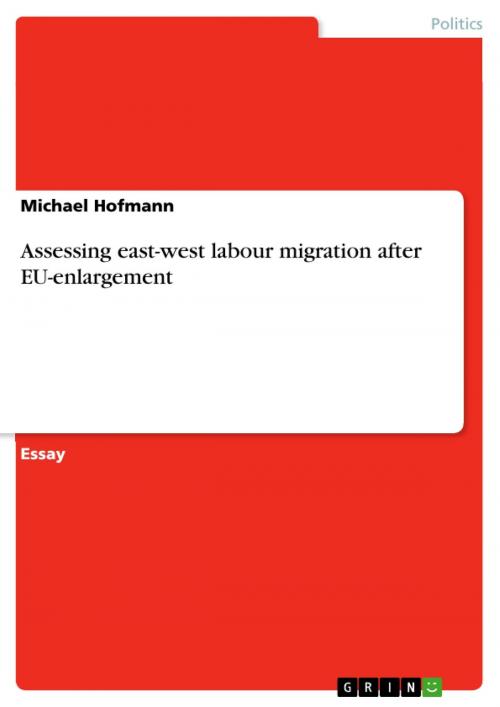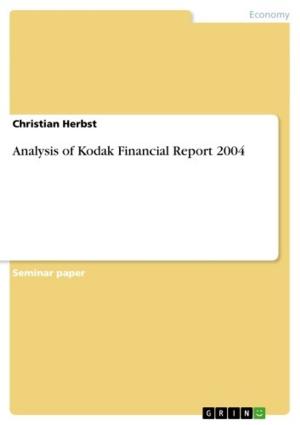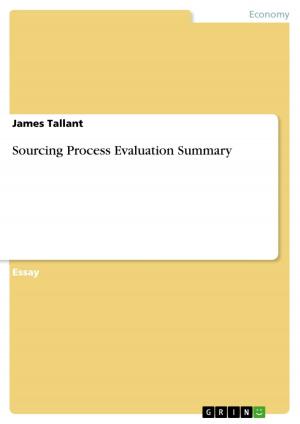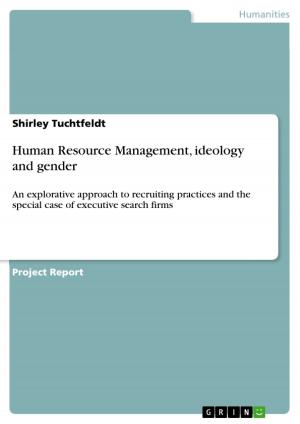Assessing east-west labour migration after EU-enlargement
Nonfiction, Social & Cultural Studies, Political Science| Author: | Michael Hofmann | ISBN: | 9783638755689 |
| Publisher: | GRIN Publishing | Publication: | June 13, 2007 |
| Imprint: | GRIN Publishing | Language: | English |
| Author: | Michael Hofmann |
| ISBN: | 9783638755689 |
| Publisher: | GRIN Publishing |
| Publication: | June 13, 2007 |
| Imprint: | GRIN Publishing |
| Language: | English |
Essay from the year 2006 in the subject Politics - International Politics - Topic: Globalization, Political Economics, grade: 72 (UK system), University of Kent, language: English, abstract: On May 1, 2004, ten new countriesi joined the European Union (EU). Besides the Mediterranean countries of Cyprus and Malta, eight Central and Eastern European Countries (CEEC/EU-8) became members of the EU. The developments that lead to the enlargement in 2004 were accompanied by concerns in the fifteen old member states (EU-15) regarding the potential inflow of workers from the EU-8. The Free Movement of Workers is a fundamental pillar of the EU's internal market and is legally defined in Article 39 I of the Treaty of the European Community.ii According to this principle, every citizen of the EU is entitled to take up employment and to answer to job-offers EU wide. Some countries of the EU-15 feared that their labour markets were going to be flooded by Eastern European workers. Polish plumbers and Czech pavers, taking over the jobs of the EU-15 citizens, became symbols of the fear that was spreading in some EU-15 countries. This essay will focus on two aspects: Firstly, it will examine whether the estimated migration scenarios prior to enlargement have been able to picture the current migration flows correctly. In a second step, the short- and medium-term impacts of EU-10 migration on the economies of the UK and Germany will be assessed. Whereas the former decided to allow migrant workers access to its labour market from the very beginning, the latter had chosen to restrict the free movement of workers and is currently considering extending these restrictions until 2009. It will be argued that the fears concerning negative economic effects in the UK were irrational - at least concerning the short-term impact. In regard to the German case, it will be argued that extending the restrictions until 2009 will have only a limitedly harmful effect on the economy.
Essay from the year 2006 in the subject Politics - International Politics - Topic: Globalization, Political Economics, grade: 72 (UK system), University of Kent, language: English, abstract: On May 1, 2004, ten new countriesi joined the European Union (EU). Besides the Mediterranean countries of Cyprus and Malta, eight Central and Eastern European Countries (CEEC/EU-8) became members of the EU. The developments that lead to the enlargement in 2004 were accompanied by concerns in the fifteen old member states (EU-15) regarding the potential inflow of workers from the EU-8. The Free Movement of Workers is a fundamental pillar of the EU's internal market and is legally defined in Article 39 I of the Treaty of the European Community.ii According to this principle, every citizen of the EU is entitled to take up employment and to answer to job-offers EU wide. Some countries of the EU-15 feared that their labour markets were going to be flooded by Eastern European workers. Polish plumbers and Czech pavers, taking over the jobs of the EU-15 citizens, became symbols of the fear that was spreading in some EU-15 countries. This essay will focus on two aspects: Firstly, it will examine whether the estimated migration scenarios prior to enlargement have been able to picture the current migration flows correctly. In a second step, the short- and medium-term impacts of EU-10 migration on the economies of the UK and Germany will be assessed. Whereas the former decided to allow migrant workers access to its labour market from the very beginning, the latter had chosen to restrict the free movement of workers and is currently considering extending these restrictions until 2009. It will be argued that the fears concerning negative economic effects in the UK were irrational - at least concerning the short-term impact. In regard to the German case, it will be argued that extending the restrictions until 2009 will have only a limitedly harmful effect on the economy.















